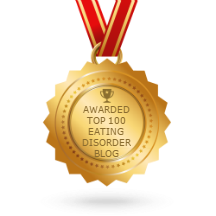- Home
- About
-
Services
- Therapy
-
Eating Disorder Trainings
>
- Clinical Approaches To Treating Body Image Issues
- Clinical Approaches To Treating Bulimia & Binge Eating Disorder
- Finding Freedom From Binge Eating
- Finding Freedom From Anorexia
- Supporting A Loved One With An Eating Disorder
- Eating Disorder Recovery Road Map
- Healing From Body Hate And Practicing Self-Compassion
- Common Questions
- Blog
- Press
- Contact
|
Pretty much anything in life that i've done which was worthwhile, involved a decent amount of fear. From facing my fear of public speaking (I have since spoken on the news and at a national eating disorders conference!) to starting my own private therapy practice-anytime I have stepped out of my comfort zone, I was initially afraid to do so. However, through my own personal and professional experiences, i've learned that sometimes feeling afraid is a sign that you are about to do something really brave. Fear and Eating Disorder Recovery Recovering from an eating disorder is all about stepping outside of your comfort zone, facing fears, and defying the voice of the eating disorder - time and time again. However, there may come a point, either in the early or later stages of recovery, when you decide that you no longer need to push or challenge yourself as much. Or you might find that you feel terrified of letting go of the "eating disorder rules," and you tell yourself that you should just "give up." The desire to stick to “what feels safe” is completely normal. Even for individuals who have not been affected by eating disorders, there is an impulse to stay with what is comfortable and familiar. A comfort zone may feel like a “safe” place to be, however no major growth ever happens there. To truly grow and strengthen your recovery, it is critical to continue to challenge yourself on a regular basis, whether it’s trying new restaurants, facing “fear or trigger foods,” being more flexible with exercise (or taking a complete break from it!), or surfing your urges to engage in eating disorder behaviors. Additionally, just because something feels "safe" or "comfortable," doesn't mean that it actually is. Your eating disorder will say whatever it needs to in order to keep itself alive. Using eating disorder behaviors may feel comfortable, however the reality is that this can be emotionally and physically dangerous-even deadly. In my work as a therapist helping people who are struggling with eating disorders, I express that the aim is to feel uncomfortable, but not unsafe. I help people to challenge themselves gradually in a way that is anxiety-provoking, yet doesn’t feel unmanageable. Thus, it can be helpful to start by pushing yourself out of your comfort zone in small and gradual steps. Feel The Fear And Take Action Anyway Often people avoid taking risks because they think that they need to wait until they feel confident enough to do so. However, the paradox of this is that you will only begin to feel less afraid and gain confidence by gradually exposing yourself to what you are afraid of Susan Jeffers, Ph.D., exemplifies this in her book entitled “Feel The Fear... And Do it Anyway” when she says, “I had grown up waiting for the fear to go away before I took any chances. When I am no longer afraid... then! For most of my life I had played the when/then game and it never worked... Fear of particular situations dissolved when I finally confronted them. The doing it comes before the fear goes away.” Rather than trying to get rid of your fear, keep in mind that it is normal and okay to feel afraid. Further, you can feel afraid and take pro-recovery actions anyway. The less that you give into the voice of fear and allow it to control your actions, the more empowered and free you will feel over time. Instead of trying to “get rid,” of the fear, I help my clients to begin to change their relationship to fear. Any process of change and growth will typically bring up some fear and anxiety. Instead of “buying into” the fear-based beliefs or messages, it’s important to start by recognizing the stories that your mind is telling you. We all have 1,000s of thoughts per day. However, just because you have a thought-does not mean that it is true. With time and practice, you can strengthen your "true voice," and use your healthy side in order to heal the eating disorder part. You Are So Brave To all of the people working on facing their fears in eating disorder recovery, you are so brave. Recovery is difficult (if it was easy, then myself and many others would not have jobs). However, it will get easier the more that you practice separating yourself from your eating disorder thoughts and taking gradual steps out of your comfort zone. My clients and the many other courageous people who are working on their recovery despite having the voice of an eating disorder yelling at them, inspire me. Marya Hornbacher sums it up best when she says: “I don’t remember when I stopped counting, or when I stopped caring what size my pants were, or when I started ordering what I wanted to eat and not what seemed ‘safe,’ or when I started just eating when I got hungry, instead of questioning it, obsessing about it, dithering and freaking out, as I’d done for nearly my whole life. I don’t remember exactly when recovery took hold, and went from being something I both fought and wanted, to being simply a way of life. A way of life that is, let me tell you, infinitely more peaceful, infinitely happier, and infinitely more free than life with an eating disorder. And I wouldn’t give up this life of freedom for the world." Jennifer Rollin, MSW, LCSW-C: is an eating disorder therapist in private practice in Rockville, Maryland. Jennifer specializes in helping teens and adults struggling with anorexia, binge eating disorder, and bulimia, and body image issues. Jennifer provides eating disorder therapy in Rockville, MD, easily accessible to individuals in Potomac, North Potomac, Bethesda, Olney, Germantown, and Washington D.C. Connect with Jennifer through her website: www.jenniferrollin.com Check out Jennifer's on-demand eating disorder trainings here!
0 Comments
Leave a Reply. |
About MeI'm an eating disorder therapist in private practice in Rockville, MD. Archives
June 2024
|


 RSS Feed
RSS Feed
